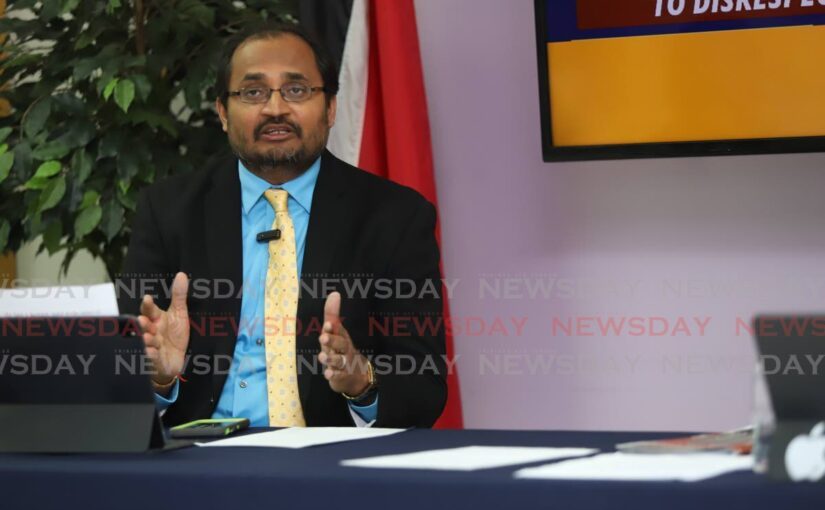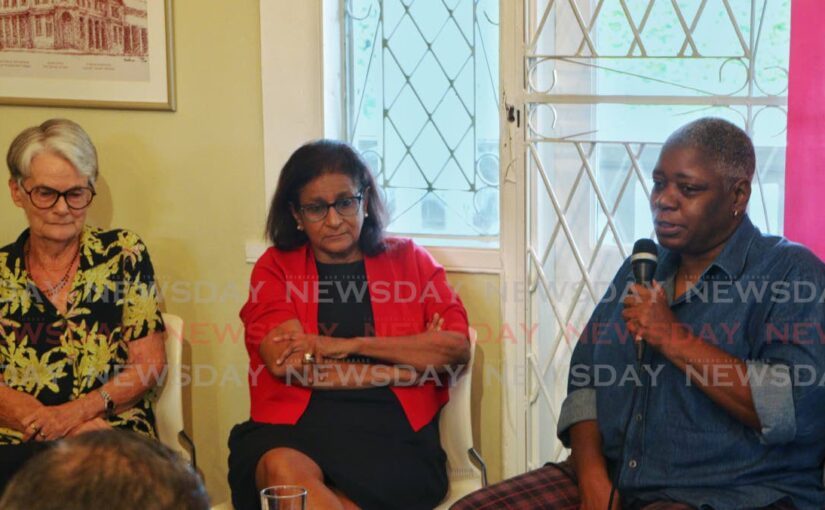THE coming election is likely to be a real rough-and-tumble exercise, with the exact date still a mystery. Look, while quite legal, I don’t agree...
Vous n'êtes pas connecté
- English
- Français
- عربي
- Español
- Deutsch
- Português
- русский язык
- Català
- Italiano
- Nederlands, Vlaams
- Norsk
- فارسی
- বাংলা
- اردو
- Azərbaycan dili
- Bahasa Indonesia
- Հայերեն
- Ελληνικά
- Bosanski jezik
- українська мова
- Íslenska
- Türkmen, Түркмен
- Türkçe
- Shqip
- Eesti keel
- magyar
- Қазақ тілі
- Kalaallisut ; kalaallit oqaasii
- Lietuvių kalba
- Latviešu valoda
- македонски јазик
- Монгол
- Bahasa Melayu ; بهاس ملايو
- ဗမာစာ
- Slovenščina
- тоҷикӣ ; toğikī ; تاجیکی
- ไทย
- O'zbek ; Ўзбек ; أۇزبېك
- Tiếng Việt
- ភាសាខ្មែរ
- རྫོང་ཁ
- Soomaaliga ; af Soomaali
Rubriques :
 Maroc - NEWSDAY.CO.TT - A la Une - 04/Aug 14:15
Maroc - NEWSDAY.CO.TT - A la Une - 04/Aug 14:15
When governments fail to listen
A lot has already been said, but I still extend very best wishes to my African friends and fellow citizens on the Emancipation celebrations. The Emancipation journey, however, is far from complete, as we continue to endure restraining mental and political trappings. This reminds me of the big elephant tied to a post. "Pa," the son asked, "why is this big elephant remaining tied?" The father replied: “Son, it is because it is used to it.” Talking about “Emancipation” in this country will remain a floating abstraction if as a start there is no reference to our inefficient, obstructive and unjust parliamentary structure, the place where our rights and freedoms are formulated. Cultural emancipation, dignity and respect, will not succeed without political emancipation. Westminster socialised us into the concept of separation of powers among the executive, legislative and judiciary – to help ensure fairness and accountability. The theory in the first place is that the executive should be accountable and answer to the legislative. But, as I previously repeated, the reality is that the executive (ministers) comfortably sits and controls the legislature. The head of the executive is also the political head of the legislature. The legislature protects the executive (ministers). What kind of democracy is this? There is need for political emancipation here. Or was Sparrow right? Do we really like it so, remaining chained to an archaic system where equity and accountability have more form than substance. What was good for England is not necessarily good for us. We should be emancipated from such colonial trappings. And we should put our minds to that – emancipate ourselves. Cultural emancipation will not really come without political emancipation. The irony is that the PM himself seems to understand the dilemma when, explaining the inefficiencies of local government, he alludes to challenges of “mismanagement and the system.” As several international and local expert reports have explained, the longer we take to fix the parliamentary and political system, the longer current problems will continue. They will likely get worse. In 2000, an IDB report, with data-driven analyses and proposals, showed how improving state institutions and political accountability can inspire people-driven development, that is, “development beyond economics.” Our government got this report. UNDP reports consistently advocate accountable and genuinely representative governments. One of its early reports (2002) stated: “Politics is as important as economics to successful development. It also requires that “poor people also have political power.” Of course, that is controversial, but we should not have a political system with poor people perpetually begging, protesting, pleading. The report concluded: “The overall result is an increasingly alienated and angry population.” In other words, in this and subsequent reports, like those of the IDB and local ones, there were warnings and specific proposals to our government so as to avoid further social and security degradation. It appears we didn’t listen. In 1993, for example, an IDB expert team, headed by Sir Alister McIntyre and including William Demas and Frank Rampersad, developed a strategic plan for TT, Building National Consensus on Social Policy. Numerous proposals were made for crime reduction, job creation, social welfare and subsidies reform, reducing rural-urban inequity, improving government performance and accountability, etc. An Immediate Action Plan with 50 specific actionable proposals was submitted to the government. Who listened? Who cared? That report joined the heap. Today, over 30 years after, we are seeing the results. The team’s conclusion: “It is unquestionably the case in TT that the negative social trends which have emerged are impairing the country’s economic development, not the least because of the despondency which it is breeding, particularly among the youth.” In a exhaustive survey of crime, gangs and violence related to social, political and economic conditions, the Caribbean Human Development Report (2012) concluded: “Of primary concern with citizen safety is the issue of public confidence in state capacity to protect citizens. If citizens lack confidence in the police, judiciary and other public authorities, no amount of repression will restore security.” Did we listen? The World Bank in 2006 developed a package of recommendations to promote equity, public safety and fairness in countries like ours. Our government got this report. In 2007, the UN Office on Drugs and Crime examined crime and violence in this country and the Caribbean, and properly concluded: “There has been an over-reliance on the criminal-justice approach to crime reduction to the detriment of other complementary approaches.” Repeated complaints and proposals about this country’s deteriorating social conditions come from editorials, print and electronic commentaries and media letters, but with no positive results. Elected officials are too insulated. They don’t have to listen. This system needs emancipation. The tragedy is that for the past 40 years at least, there has been a bulk of reputable data-driven analyses, reports and proposals warning our governments of the impending disasters. Government apparently did not listen. These reports and proposals have filled the “policy graveyard,” leaving governments to practise “starting-from-scratch” habits and struggling to reinvent the expensive wheel. When governments fail to listen to good advice, the country suffers. The post When governments fail to listen appeared first on Trinidad and Tobago Newsday.
Articles similaires
Constitution report: We the (PNM) People?
DINESH RAMBALLY AMIDST THE manufactured controversy about the steelpan on the coat of arms, another issue of importance has been neglected: the...
Readers Write: September 2024
Questions about MCC ethos I appreciate Canadian Mennonite’s reporting on the open letter from terminated Mennonite Central Committee (MCC)...
Crime judiciary’s responsibility too
THE EDITOR: Our Constitution, which forms the foundations of the State, establishes three important arms of governance, the legislature (Parliament),...
Crime judiciary’s responsibility too
THE EDITOR: Our Constitution, which forms the foundations of the State, establishes three important arms of governance, the legislature (Parliament),...
Kamla fearmongering over progress
THE EDITOR: Kamla Persad-Bissessar's recent statements reflect a troubling departure from sound, forward-thinking policies that are essential to the...
Senator Maharaj: People losing hope for change
FORMER journalist and Independent Senator Sunity Maharaj says constitutional reform is the beginning of a means to begin to anchor a culture of...
Hanif Benjamin: Poverty driving teens to crime
CLINICAL traumatologist and president of the Centre for Human Development Ltd Hanif Benjamin says poverty is the main driving force behind teens'...
Iranian Regime Insiders Warn About Growing Discontent And Imbalances – OpEd
Protests by people frustrated with the electricity crisis, which has disrupted lives across various parts of Iran, have sounded alarms among regime...
Democracy’s Damndest Defamation – OpEd
In a democracy, people automatically become liable for whatever the government inflicts upon them. Many of the most deadly errors of contemporary...
Les derniers communiqués
-
Aucun élément







